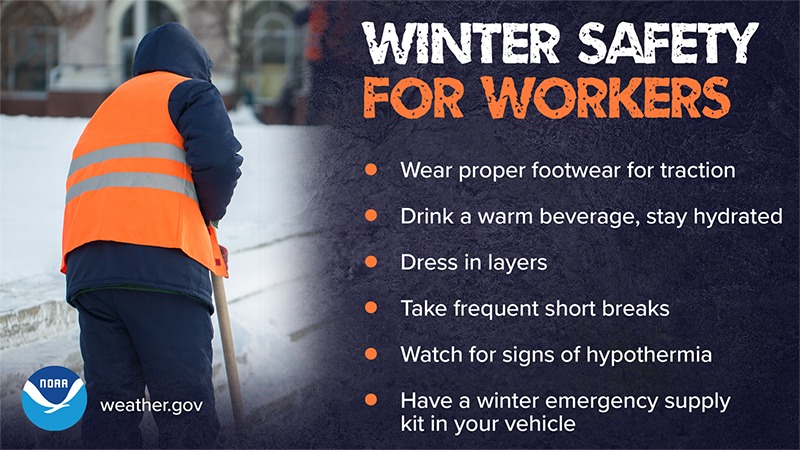Winter Weather Preparedness
As it gets colder for many areas this time of year, construction workers and those working out in the elements need to prepare for the dropping temperatures. Winter weather presents hazards, including slippery roads/surfaces, strong winds, and environmental cold. Employers must help to prevent illnesses, injuries, and fatalities, by controlling these hazards in workplaces impacted by winter weather.
OSHA and the National Oceanic and Atmospheric Administration (NOAA) are working together on a public education effort aimed at improving the way people prepare for and respond to severe weather.
Below are guidelines for employers on what topics workers should be trained on:
- Cold Stress:
- How to recognize the symptoms of cold stress
- Preventing cold stress injuries and illnesses
- The importance of self-monitoring and monitoring coworkers for symptoms
- First aid and how to call for additional medical assistance in an emergency
- How to select proper clothing for cold, wet, and windy conditions
- Other Winter Weather Related Hazards:
- Identifying other hazards that workers may be exposed to, such as slippery roads and surfaces, windy conditions, and downed power lines
- How to recognize these hazards
- How workers could be protected through engineering controls, safe work practices, and proper selection of equipment — including personal protective equipment (PPE)
Additionally, OSHA offers safety tips for workers:
- Your employer should ensure that you know the symptoms of cold stress
- Monitor your physical condition and that of your coworkers
- Dress appropriately for any cold weather conditions
- Stay dry in the cold since moisture or dampness, such as from rain or sweating, can increase the rate of heat loss from the body
- Keep extra clothing (including underwear) handy in case you get wet and need to change
- Drink warm, sweetened fluids. The sweetness helps the body store energy (avoid alcohol)
- Use proper engineering controls, safe work practices, and personal protective equipment provided by your employer
To learn more, visit: https://www.osha.gov/winter-weather/preparedness
Credit: OSHA and NOAA
Learn more about HazTek Safety & OSHA Training.
